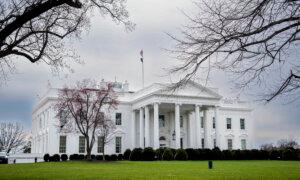Parts of the government would be funded through March 8 while the rest would be funded through March 22.
Congressional leaders have struck a deal to avert a government shutdown.
The development was announced in a joint Feb. 28 statement by House Speaker Mike Johnson (R-La.), Senate Majority Leader Chuck Schumer (D-N.Y.), House Minority Leader Hakeem Jeffries (D-N.Y.), and Senate Minority Leader Mitch McConnell (R-Ky.), along with leaders from the House and Senate appropriations committees.
However, another continuing resolution to fund the government at current levels will need to be passed, they said. Parts of the government would be funded through March 8 while the rest would be funded through March 22.
This is to allow for the appropriations committees to hammer out the final text.
“Negotiators have come to an agreement on six bills: Agriculture–FDA, Commerce–Justice and Science, Energy and Water Development, Interior, Military Construction–VA, and Transportation–HUD,” the announcement said.
“After preparing final text, this package of six full year Appropriations bills will be voted on and enacted prior to March 8,” they continued. “These bills will adhere to the Fiscal Responsibility Act discretionary spending limits and January’s topline spending agreement.”
A final text is expected to be available by the weekend. Mr. Johnson’s office did not respond to an inquiry seeking the spending levels for those six appropriations bills.
“The remaining six Appropriations bills—Defense, Financial Services and General Government, Homeland Security, Labor–HHS, Legislative Branch, and State and Foreign Operations—will be finalized, voted on, and enacted prior to March 22,” the leaders said.
Funding that expires at midnight on March 2 relates to the Department of Veterans Affairs, Department of Transportation, Department of Agriculture, and Department of Housing and Urban Development.
The rest of the government funding expires at midnight on March 9 and affects the Department of Defense, Department of Education, Department of Labor, Department of Justice, Department of Health and Human Services, Department of Interior, Department of Homeland Security, Department of State, and Department of Commerce.
‘Frank and Honest’ Meeting
The previous day, following a meeting at the White House with President Joe Biden, Mr. Johnson and other congressional leaders expressed optimism that there would not be a partial government shutdown.
“It was frank and honest,” said Mr. Johnson, who took part in a meeting that also included Mr. Schumer, Mr. Jeffries, and Mr. McConnell. Mr. Johnson also talked with the president one-on-one in the Oval Office.
He said he relayed the point that America’s needs must come first, namely dealing with the crisis at the southern border.
Mr. Johnson said he is “very optimistic” about preventing a government shutdown. He said he told the president that the House would look at the issues included in the Senate package, such as foreign assistance to Ukraine, Israel, and the Indo-Pacific.
He reiterated that the president can take unilateral action to secure the border.
“It’s time for action. It is a catastrophe, and it must stop,” said Mr. Johnson. “And we will get the government funded, and we’ll keep working on that.”
Mr. Schumer said the meeting was “productive” and “intense.”
“We are making good progress” in trying to avert a government shutdown, Mr. Schumer said. He remarked that the disagreements between the sides are not “insurmountable.”
A shutdown would affect many people “even for a short period of time,” and Mr. Johnson concurred, according to Mr. Schumer.
President Biden said that a government shutdown would be detrimental to the economy.
The last time there was a government shutdown was between Dec. 22, 2018, and Jan. 25, 2019, which was the longest stretch since the shutdown between Dec. 16, 1995, and Jan. 5, 1996.
Original News Source Link – Epoch Times
Running For Office? Conservative Campaign Consulting – Election Day Strategies!


